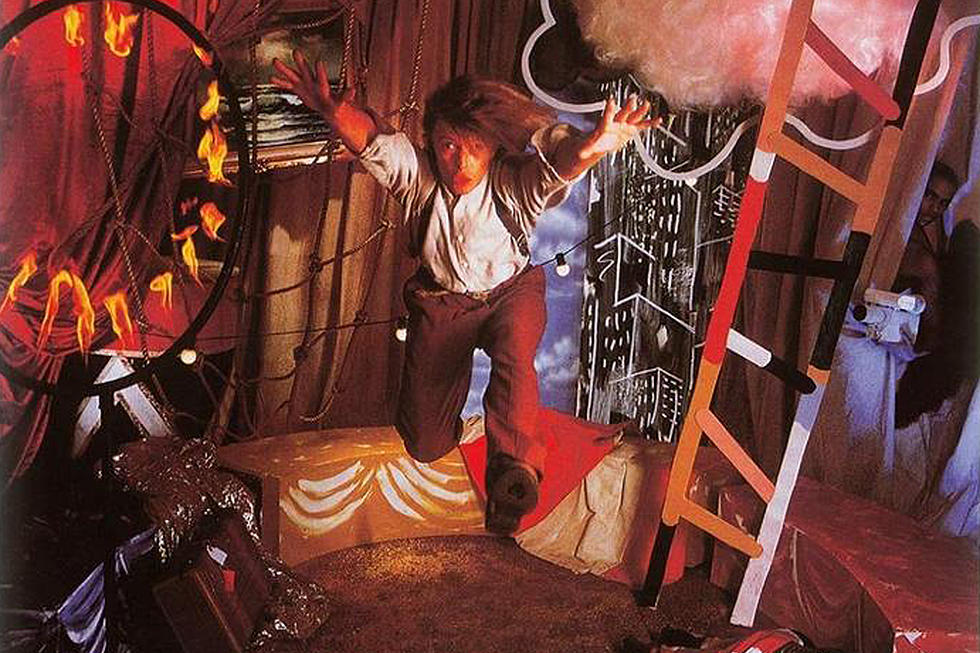
Is ‘Never Let Me Down’ Really David Bowie’s Worst Album?
Despite its then state-of-the-art studio sheen and a willfully eclectic approach – or perhaps because of them – Never Let Me Down was one of David Bowie’s biggest let downs. A casual look at a handful of musical sites’ best-of lists, including ours, ranks this release dead last in the artist’s sprawling oeuvre. But is it really Bowie’s worst?
Upon its release in 1987, Never Let Me Down garnered mixed reviews. While critic Ira Robbins called the collection “slapdash and slight,” Spin said the set was “imbued with contagious energy that gives ideas a leg to dance on.” To be sure, the new album was loud, energetic and busy – too busy. Like a Flock of Seagulls haircut, Never Let Me Down’s production plays like a parody of bad '80s fashion, with Bowie’s fluid and emotive vocals often buried in crashing synthesized drums that leave him shouting in a maelstrom.
It seemed that Bowie had been hoisted on his studio petard, buried in the artificial drum and synthesizer sounds that he, Brian Eno and Tony Visconti had popularized in 1976 with Low. Put off by the album's noisy, stereotypically '80s production, critical opinions, including Bowie’s, inevitably soured. Looking back in 1995 he said, “My lack of interest in my own work was really becoming transparent. My nadir was Never Let Me Down.”
So if the main man himself said the album sucks, it must be pretty bad, right? Not so fast.
Bowie’s responses to the press have always been as notoriously chameleon-like as his vaunted ever-changing personae. Bowie initially felt that after the torpid pop of Tonight, Never Let Me Down was a return to the guitar rock of Scary Monsters (And Super Creeps), launching the fervent hope of fans throughout the '80s that whatever the artist currently had in the pipeline would be Bowie’s best since that 1980 paean to paranoia and exhaustion.
Watch David Bowie's Video for 'Day-In Day-Out'
Then in 2008, Bowie released a radically remixed version of Never Let Me Down’s best and most haunting track, “Time Will Crawl,” as part of his iSelect compilation. Happy with the results, Bowie stated he wanted to re-record the entire album, a wish that was granted when producer Mario McNulty released a new version two years after Bowie’s death in 2016. The 2018 edition strips away everything from the original save Bowie’s vocals and few grace notes including contributions from original guitarists Peter Frampton and Carlos Alomar, and begins anew.
For many, the 2018 Never Let Me Down delivers the critical coup de grace for the bombastic 1987 version of the album. The original record was so bad, the argument goes, that former Bowie associates were compelled, borrowing a song title from Bowie’s '70s art rock contemporaries Roxy Music, to remake and remodel Never Let Me Down.
On the contrary, the success of the reconstituted Never Let Me Down proves that the songs on the original record are strong, albeit buried in the busy production, and that Bowie’s vocals are consistently committed and excellent. Nothing can rehabilitate the '50s pastiche “Too Dizzy,” which was excised from subsequent reissues of the album, and the portentous prog rock “Glass Spider,” which features a macabre Bowie narration that uncomfortably recalls Christopher Guest as Spinal Tap’s Nigel Tufnel introducing “Stonehenge.”
But many songs belie the record’s reputation as a slapdash collection of various Bowie sounds and visions from the past. “Shining Star,” which was slated as a single until the record company EMI vetoed the idea, is weird but catchy. Bowie sings alliterative tongue-twisting verses high above his range to a sparkling dance track that is hampered only by electronic drums that sound like rotten apples splatting on a sidewalk, and a mid-song rap spoiled by contributor Mickey Rourke’s mush-mouthed delivery.
“87 and Cry,” an acidic takedown of Britain’s then-Prime Minister Margaret Thatcher, boasts a solid groove kicked off by a growling, coiling guitar lick. Similarly, “New York’s in Love” is an energetic funk workout in the vein of Wilson Pickett’s version of “Land of 1000 Dances,” capped with a howling Frampton guitar lead that revs like a V-8 engine.
Watch David Bowie's Video for 'Time Will Crawl'
These worthy tunes are ultimately defeated by dense curtains of cascading synthesizers and far too many fiddly bits of random guitar, but three songs succeed despite the dated sonic sheen.
Featuring Bowie’s best soul-shouting vocal, “Day-In Day-Out” is a propulsive rocker that is actually aided by the layers of crashing drums and coruscating guitars. “Time Will Crawl,” one of Bowie’s finest songs of any era, boasts a melancholy vocal complemented by a chiming, nursery rhyme synthesizer line. Riding Bowie’s locomotive wail harmonica and Alomar’s radiating rhythm guitar, the album’s title track also ranks as one of Bowie’s better compositions.
On Never Let Me Down, three memorable songs leap out at the listener, unhampered by the unfashionable, oh-so-'80s production. Compare that to “Blue Jean,” the single good song on Tonight, and “Jump They Say,” the sole highlight of Black Tie White Noise.
While overall, the album is still near the bottom of the Bowie barrel, Never Let Me Down is far from being the nadir of Bowie’s long stretch between Let’s Dance in 1983 and Outside in 1995. It’s an undigested mix of ideas, time signatures and grooves that never quite comes together, but the same can be said for the 1979 capstone of the erroneously labeled Berlin trilogy, Lodger, and side two of Scary Monsters.
Never Let Me Down can boast a handful of tracks that are a credible mix of the commercial and the experimental, a characteristic which has always been the mainstay of Bowie’s best work.


